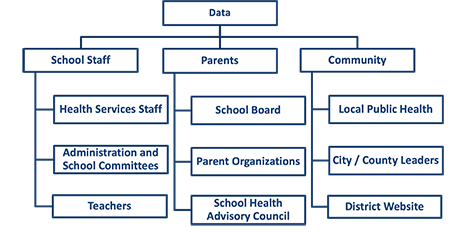School Health Office Data Collection
There is a rich amount of data that is collected by school nurses and those working in the school health office. While much of the information is student specific and protected by FERPA, that same data can be aggregated to understand the student population, which includes health conditions, services provided, types of referrals for services in the community, and the workload of health services staff.
This data is important to help inform local decision making related to meet the needs of students, evaluate current school health services, and plan for changes when needed. School health office data can help to inform initiatives around absenteeism, school climate, and mental health services. Many schools now utilize some type of electronic health record, which can make data reporting less burdensome.
Data tells the story. Data should be shared with school staff including health services, administration, school committees and teachers. Data should be shared with parents, school board members, parent organizations and school health advisory councils. Data should be shared with the community including local public health, city or county leaders and posted on the school website.

Some areas to consider for data collection.
- Number of students served in the health office daily/annually.
- Number and types of student chronic conditions including care management activities.
- Outcomes for students seen in the health office such as return to class, sent home, referred for care.
- Number and types of students receiving medication daily, periodically and for emergencies.
- Number and type of health care plans for students including Individual Health Plans (IHP), Emergency Care Plans, 504 accommodations, and individual educational plans (IEP).
- Delegation training and supervision by the RN/LSN provided to numbers of staff and time involved.
- Participation on various school teams and community teams.
- Staff training provided in groups or individually.
- Screening numbers, referrals, and completions/success.
- Classroom and small group education to students.
- Immunization monitoring and reporting to MDH.
- Infectious disease monitoring, reporting to MDH.
- Care coordination with providers and supports/resources for families.
The National Association of School Nurses (NASN) provides Data Literacy Training and Resources including webinars and templates to report district or school data which can be used to help present individual data to school leaders, school boards and school community.